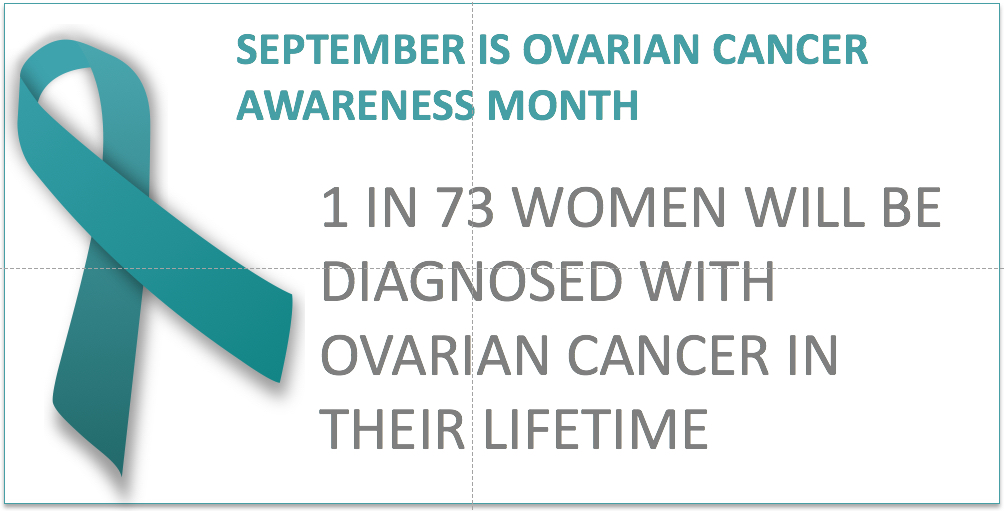Article provided by the Ovarian Cancer National Alliance
Ovarian cancer is a growth of malignant cells that begins in a woman’s ovaries. There is no early detection test or a cure, which makes ovarian cancer the deadliest disease of the female reproductive system. When detected and treated early, the five year survival rate is greater than 90%. However, fewer than 20% of women are diagnosed in the early stages because the symptoms are often overlooked or misdiagnosed. Until there is a detection test, awareness of ovarian cancer symptoms is a woman’s best defense.
Many people do not know that ovarian cancer has symptoms in the majority of women who develop the disease including:
• bloating;
• pelvic and abdominal pain;
• difficulty eating or feeling full quickly; and
• urinary symptoms (urgency or frequency)
Additional symptoms may include fatigue, indigestion, back pain, pain with intercourse, constipation and menstrual irregularities, although these symptoms are found equally in women without the disease. See your doctor, preferably a gynecologist, if you have these symptoms almost daily for more than a few weeks. Experts suggest a combination pelvic/rectal exam, a transvaginal ultrasound and a CA-125 blood test.
Approximately 22,000 American women will be diagnosed with ovarian cancer in 2008 and about 15,000 women will die from the disease. Women need to know if they may be at a higher risk for ovarian cancer, and if so, what actions to take. Factors that increase risk include:
• increasing age,
• personal or family history of ovarian cancer,
• breast or colon cancer, and
• never having been pregnant or given birth to a child.
Still, all women are at risk. In fact, 90% of women diagnosed do not have a family history that might put them at a higher risk.
More research is needed to develop an early detection test and a cure. There is no reliable and easy-to-administer early detection test for ovarian cancer (as there is for cervical cancer with a Pap test). Ovarian cancer research is drastically under-funded. Federal appropriations for ovarian cancer research have declined in real dollars, although the death rate has remained stagnant for 30 years. Survivorship will not improve without greatly increasing and accelerating the amount of research. Improvements in ovarian cancer survival lag behind advances being made with many other cancers. For example, the five year survival rate for cervical cancer is 72%, for breast cancer 89% and for ovarian cancer 46%.
The Ovarian Cancer National Alliance (OCNA) is working to help save women’s lives. OCNA is a non-profit umbrella organization of national, regional and local scope that focuses on helping to save the lives of women who have or will have ovarian cancer by increasing advocacy, education and awareness. Its primary goals include:
• Increasing advocacy on Capitol Hill for adequate federal funding to increase ovarian cancer research and improve health care practice. OCNA seeks to double total federal funding for research over the next 10 years to $250 million annually.
• Educating and supporting policy-makers, health care professionals and ovarian cancer patients, survivors and their loved ones. For example, operating Survivors Teaching Students: Saving Women’s Lives (STS) helps medical students learn to identify women at risk for ovarian cancer and those who have the disease. Currently, the STS Program is active in more than half of the medical schools in the United States.
• Implementing public awareness campaigns about ovarian cancer, symptoms and treatment options. OCNA works with the President, House and Senate to proclaim September as National Ovarian cancer Awareness Month, which contributes significantly to public awareness of ovarian cancer. OCNA’s national Partner Member grass-roots activities include health fairs, runs, fundraisers and other events.
To join OCNA in its fight to conquer ovarian cancer or to learn more about the disease, please call 202.331.1332 or visit the web site at www.ovariancancer.org.


